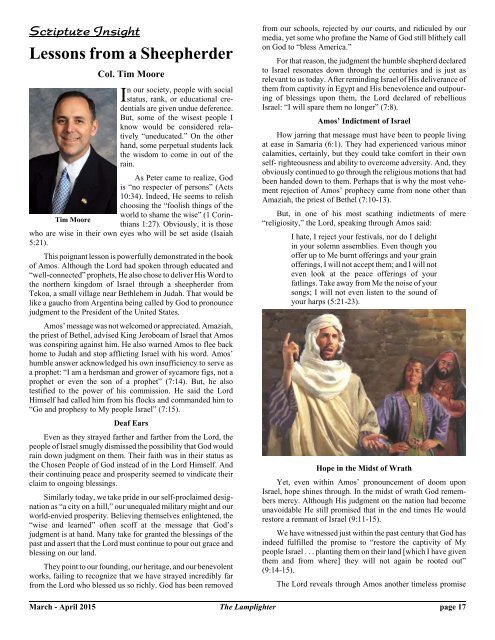Lamplighter_MarApr15_Dispersion-Jews
Lamplighter_MarApr15_Dispersion-Jews
Lamplighter_MarApr15_Dispersion-Jews
You also want an ePaper? Increase the reach of your titles
YUMPU automatically turns print PDFs into web optimized ePapers that Google loves.
Scripture Insight<br />
Lessons from a Sheepherder<br />
Col. Tim Moore<br />
In our society, people with social<br />
status, rank, or educational credentials<br />
are given undue deference.<br />
But, some of the wisest people I<br />
know would be considered relatively<br />
“uneducated.” On the other<br />
hand, some perpetual students lack<br />
the wisdom to come in out of the<br />
rain.<br />
As Peter came to realize, God<br />
is “no respecter of persons” (Acts<br />
10:34). Indeed, He seems to relish<br />
choosing the “foolish things of the<br />
world to shame the wise” (1 Corinthians<br />
1:27). Obviously, it is those<br />
Tim Moore<br />
who are wise in their own eyes who will be set aside (Isaiah<br />
5:21).<br />
This poignant lesson is powerfully demonstrated in the book<br />
of Amos. Although the Lord had spoken through educated and<br />
“well-connected” prophets, He also chose to deliver His Word to<br />
the northern kingdom of Israel through a sheepherder from<br />
Tekoa, a small village near Bethlehem in Judah. That would be<br />
like a gaucho from Argentina being called by God to pronounce<br />
judgment to the President of the United States.<br />
Amos’ message was not welcomed or appreciated. Amaziah,<br />
the priest of Bethel, advised King Jeroboam of Israel that Amos<br />
was conspiring against him. He also warned Amos to flee back<br />
home to Judah and stop afflicting Israel with his word. Amos’<br />
humble answer acknowledged his own insufficiency to serve as<br />
a prophet: “I am a herdsman and grower of sycamore figs, not a<br />
prophet or even the son of a prophet” (7:14). But, he also<br />
testified to the power of his commission. He said the Lord<br />
Himself had called him from his flocks and commanded him to<br />
“Go and prophesy to My people Israel” (7:15).<br />
Deaf Ears<br />
Even as they strayed farther and farther from the Lord, the<br />
people of Israel smugly dismissed the possibility that God would<br />
rain down judgment on them. Their faith was in their status as<br />
the Chosen People of God instead of in the Lord Himself. And<br />
their continuing peace and prosperity seemed to vindicate their<br />
claim to ongoing blessings.<br />
Similarly today, we take pride in our self-proclaimed designation<br />
as “a city on a hill,” our unequaled military might and our<br />
world-envied prosperity. Believing themselves enlightened, the<br />
“wise and learned” often scoff at the message that God’s<br />
judgment is at hand. Many take for granted the blessings of the<br />
past and assert that the Lord must continue to pour out grace and<br />
blessing on our land.<br />
They point to our founding, our heritage, and our benevolent<br />
works, failing to recognize that we have strayed incredibly far<br />
from the Lord who blessed us so richly. God has been removed<br />
from our schools, rejected by our courts, and ridiculed by our<br />
media, yet some who profane the Name of God still blithely call<br />
on God to “bless America.”<br />
For that reason, the judgment the humble shepherd declared<br />
to Israel resonates down through the centuries and is just as<br />
relevant to us today. After reminding Israel of His deliverance of<br />
them from captivity in Egypt and His benevolence and outpouring<br />
of blessings upon them, the Lord declared of rebellious<br />
Israel: “I will spare them no longer” (7:8).<br />
Amos’ Indictment of Israel<br />
How jarring that message must have been to people living<br />
at ease in Samaria (6:1). They had experienced various minor<br />
calamities, certainly, but they could take comfort in their own<br />
self- righteousness and ability to overcome adversity. And, they<br />
obviously continued to go through the religious motions that had<br />
been handed down to them. Perhaps that is why the most vehement<br />
rejection of Amos’ prophecy came from none other than<br />
Amaziah, the priest of Bethel (7:10-13).<br />
But, in one of his most scathing indictments of mere<br />
“religiosity,” the Lord, speaking through Amos said:<br />
I hate, I reject your festivals, nor do I delight<br />
in your solemn assemblies. Even though you<br />
offer up to Me burnt offerings and your grain<br />
offerings, I will not accept them; and I will not<br />
even look at the peace offerings of your<br />
fatlings. Take away from Me the noise of your<br />
songs; I will not even listen to the sound of<br />
your harps (5:21-23).<br />
Hope in the Midst of Wrath<br />
Yet, even within Amos’ pronouncement of doom upon<br />
Israel, hope shines through. In the midst of wrath God remembers<br />
mercy. Although His judgment on the nation had become<br />
unavoidable He still promised that in the end times He would<br />
restore a remnant of Israel (9:11-15).<br />
We have witnessed just within the past century that God has<br />
indeed fulfilled the promise to “restore the captivity of My<br />
people Israel . . . planting them on their land [which I have given<br />
them and from where] they will not again be rooted out”<br />
(9:14-15).<br />
The Lord reveals through Amos another timeless promise<br />
March - April 2015 The <strong>Lamplighter</strong> page 17


